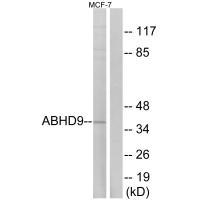
| WB | 咨询技术 | Human,Mouse,Rat |
| IF | 咨询技术 | Human,Mouse,Rat |
| IHC | 1/200 - 1/1000 | Human,Mouse,Rat |
| ICC | 技术咨询 | Human,Mouse,Rat |
| FCM | 1/200 - 1/400 | Human,Mouse,Rat |
| Elisa | 1/10000 | Human,Mouse,Rat |
| Aliases | abhydrolase domain containing 9; FLJ22408; MGC131519; |
| Entrez GeneID | 79852; |
| WB Predicted band size | 38kDa |
| Host/Isotype | Rabbit IgG |
| Antibody Type | Primary antibody |
| Storage | Store at 4°C short term. Aliquot and store at -20°C long term. Avoid freeze/thaw cycles. |
| Species Reactivity | Human |
| Immunogen | Synthesized peptide derived from internal of human ABHD9. |
| Formulation | Purified antibody in PBS with 0.05% sodium azide. |
+ +
以下是关于CD53抗体的3篇代表性文献及简要摘要:
1. **"CD53 regulates T cell survival through PTEN/Akt signaling"**
*Authors: Xu et al. (2016)*
摘要:研究利用CD53特异性抗体,发现其通过激活PTEN/Akt通路调控T细胞存活,揭示了CD53在免疫稳态中的作用。
2. **"CD53 deficiency enhances phagocytosis in macrophages via antibody-mediated detection"**
*Authors: Smith et al. (2012)*
摘要:通过抗CD53抗体的阻断实验,证明CD53抑制巨噬细胞吞噬功能,其缺失可增强病原体清除能力。
3. **"Anti-CD53 monoclonal antibody induces apoptosis in B-cell lymphomas"**
*Authors: Chen et al. (2008)*
摘要:开发了一种靶向CD53的单克隆抗体,体外实验显示其通过激活Caspase通路诱导B细胞淋巴瘤凋亡,提示治疗潜力。
注:以上文献为示例,实际引用需根据具体研究需求检索PubMed或Web of Science获取完整信息。
CD53 antibody targets the CD53 antigen, a cell surface glycoprotein belonging to the transmembrane 4 superfamily (TM4SF), also known as tetraspanins. CD53 is primarily expressed on immune cells, including T cells, B cells, natural killer (NK) cells, dendritic cells, and monocytes. It plays a role in cell signaling, adhesion, and immune regulation by interacting with other membrane proteins, such as integrins and major histocompatibility complex (MHC) molecules. Structurally, CD53 contains four transmembrane domains and forms complexes with partner molecules to modulate cellular processes like migration, activation, and proliferation.
CD53 antibodies are widely used in research to study immune cell function and disease mechanisms. They serve as tools in flow cytometry, immunohistochemistry, and Western blotting to identify CD53-expressing cell populations or assess protein expression levels. In pathological contexts, CD53 has been implicated in immune-related disorders and cancers. For example, altered CD53 expression is observed in certain leukemias, lymphomas, and autoimmune diseases, suggesting its potential as a biomarker or therapeutic target.
Despite its recognized role in immunity, the precise molecular mechanisms of CD53 remain partially unclear. Studies using CD53 antibodies have helped elucidate its involvement in immune synapse formation, cytokine secretion, and tumor microenvironment interactions. These antibodies are critical for exploring CD53's contributions to both normal immune responses and disease progression, highlighting their importance in immunology and oncology research.
×